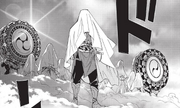| Overview |
Heaven (
Description
Heaven has shown itself to expect unwavering loyalty from its associated Amatsukami (
For example, the Emishi (エミシ Emishi?) are a group of indigenous gods who fought against Heaven in the past and were forcibly subdued as a result. After a rebel god is replaced, the Heavenly Guard monitors their guidepost and selects their shinki to ensure that the replacement god will be raised to be loyal to Heaven. Despite this, the replacement gods may still be viewed unfavorably; this is demonstrated by how the Emishi are unable to participate in Divine Councils, since they are relegated to the nosebleeds where their voices are unheard by the rest of the Amatsukami.[7]
Heaven may also remove shinki who they view as problematic or disloyal, going as far as killing many of Ebisu's strays to gain information[8] or sealing a blessed vessel in a stone sarcophagus for centuries after she participated in a rebellion.[7]
Divine Hierarchy
Translation notes outline the Divine Hierarchy as follows: Amatsukami (highest), Kunitsukami, Yaoyorozu no kami (lowest).[9]
Takama-ga-hara
Takama-ga-hara (
List of Gods Loyal to Heaven
Organization
Execution Squad

The Execution Squad (
Gods may be removed from the Execution Squad if they do something to make Heaven question their loyalty. For example, Okuninushi believes Takemikazuchi is left out of the hunt for the Crafter because of his loose involvement in the Trial by Pledge,[1] despite the fact that Takemikazuchi had spearheaded the execution of another rebel not long before.[4]
In the anime, the Execution Squad can work together to use the Pacification Ring, a devastating attack that determines whether its target is innocent, executing them only if they are guilty.[12]
Heavenly Guard
The Heavenly Guard (
Rather than engaging with the rebel directly, the Heavenly Guard takes on supportive tasks, acting independently to capture and interrogate gods[8] or shinki who are suspected to be in association with the rebel.[14][5] They also enforce punishment following a subjugation; for example, burning Ebisu's records about the Crafter.[15] Additionally, Heavenly Guards are able to emit a bright, pillar-like Beacon (
Known members of the Heavenly Guard include Ōshi, Daigo,[16] and the Kagome children.[14]
Administrative Departments
Heaven has a number of specialized departments for managerial tasks.
- Residential Affairs (
住 民 課 Jūminka?): Gods can request official approval of their shrine at the office of Residential Affairs. Their approval allows a god to participate in Divine Councils, sell merchandise to humans, and own land in Takama-ga-hara. The public office is open daily and closes at 5 PM.[17] - Shinki Employment: Another department of an unspecified name serves to find job opportunities for loose spirits who are looking to serve a god. They run a website titled "Raku-Raku Terasu (らくらくテラス)" and distribute a magazine titled "From Ama (From
天 )" containing job listings and motivational interviews with successful shinki.[18] - Shinki Labor Standards Inspection Office (
神 器 労 働 基 準 監 督 署 Shinki Rōdō Kijun Kandokusho?): This office collects survey data from shinki concerning their job satisfaction serving their current master. The survey is distributed through the "From Ama" magazine, and depending on a shinki's answers, their master may receive disciplinary action from Heaven. Unknown to the shinki, after evaluation by the office, the surveys are sent back to the shinki's master for review. They include the following questions, with space for additional comments at the very end:[18]- Please tell us how satisfied you are with your life as a shinki.
- Please tell us how satisfied you are with your life outside of work.
- If you answered D (Not satisfied) to 1 or 2, please tell us why.
- Would you like to find a new job?
Events
- Divine Council (
神議 Kamuhakari?): Heavenly gods attend the Divine Council annually during the 10th month of the traditional Japanese calendar. Typically, the ceremony mainly involves the creation of fated ties and announcement of popularity rankings of the gods.[19] Additional Divine Councils may be held spontaneously to discuss important matters of the Heavens, such as great disturbances in Nakatsukuni or Takama-ga-hara.[20][21] - Great Purification (
大 祓 Ooharai?): Occurring annually on January 1st, the Great Purification is a day where Amatsukami gather to purge ayakashi from the Near Shore.[1]
References
- ↑ 1.0 1.1 1.2 Chapter 91: The Right Thing (Vol 23)
- ↑ Volume 17: Celestial deity, page 107 (translation notes)
- ↑ Chapter 69: Shinki (Vol 18)
- ↑ 4.0 4.1 4.2 Chapter 35: Death (Vol 9)
- ↑ 5.0 5.1 5.2 5.3 5.4 Chapter 61: Renegade (Vol 16)
- ↑ Volume 16: Eight Unpardonable Crimes, page 66 (translation notes)
- ↑ 7.0 7.1 Chapter 59: The Disobedient Ones (Vol 15)
- ↑ 8.0 8.1 Chapter 33: Wielder of an Iron Will (Vol 9)
- ↑ Volume 16: Celestial deity, page 105 (translation notes)
- ↑ Volume 4: Nakatsukuni and Takama-ga-hara, page 56 (translation notes)
- ↑ Chapter 37: The Sound of You Calling My Name (Vol 10)
- ↑ Aragoto Episode 12: Your Voice Calls Out
- ↑ 13.0 13.1 Chapter 30: The Sound of Thread Snapping (Vol 8)
- ↑ 14.0 14.1 Chapter 31: Like Parent, Like Child (Vol 8)
- ↑ Chapter 86: Box (Vol 22)
- ↑ Chapter 41: Causes Nothing but Disaster (Vol 11)
- ↑ Chapter 27: Do and Due (Vol 7)
- ↑ 18.0 18.1 Stray Stories Chapter 2: A Story of Exploring the Mind of a Shinki (Vol 1)
- ↑ Chapter 58: Messy Entanglements, Crossed Signals (Vol 15)
- ↑ Chapter 25: When Sleeping Gods Are Provoked (Vol 7)
- ↑ Chapter 29: The Affairs of Three Realms (Vol 8)